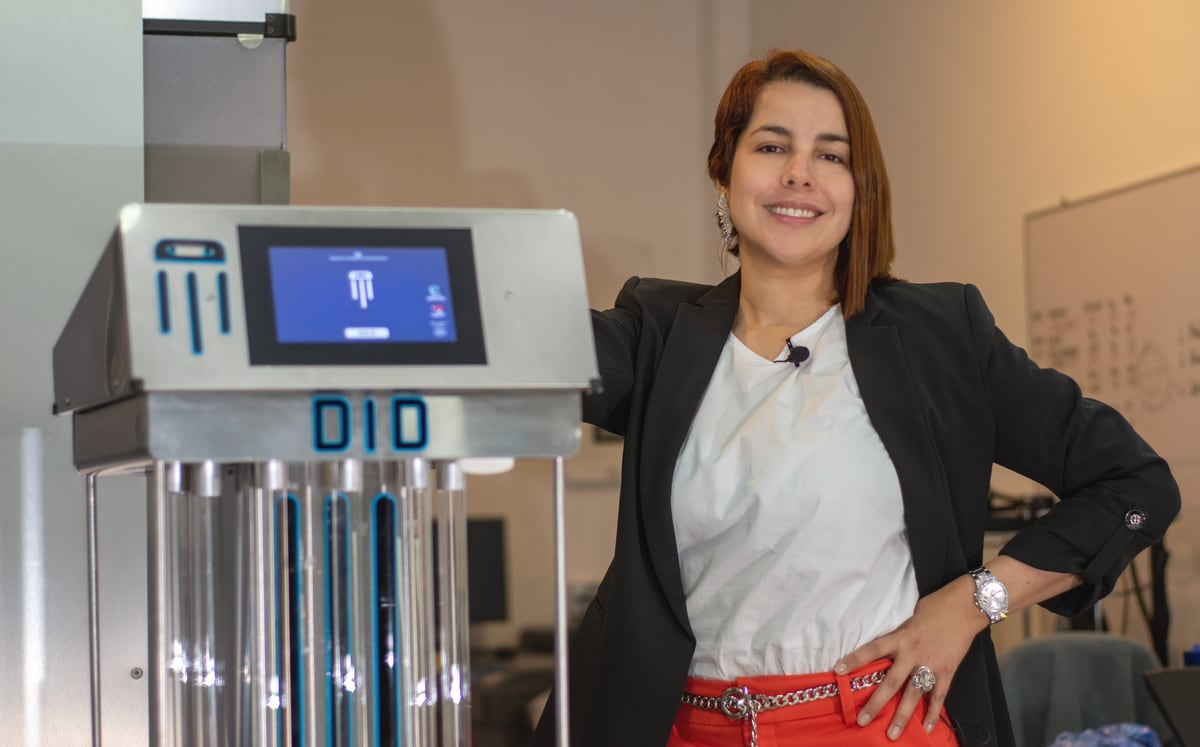Robotina, the famous cleaning lady from the series
The Jetsons
, was the inspiration for the Colombian engineer Lorena Valencia to create DID, a robot almost one and a half meters tall, with six sensors to avoid obstacles and 12 super-powerful ultraviolet lights, that destroys viruses, bacteria and fungi that are in the air or on the surfaces of any closed space.
“DID was born during the worst peaks of the pandemic to try to reduce the spread of the coronavirus,” Valencia says by phone.
Two years later, there are more than 100 active robots, disinfecting the operating rooms and intensive care rooms in clinics and hospitals in different regions of Colombia.
Valencia (Cali, 42 years old) is the director of the Octopus Force, the first technological development center in Valle del Cauca.
She and 20 other Colombian scientists who worked on the creation of DID have just received the patent that certifies the robot's originality, protects its designs and characteristics, and allows it to be distributed in other countries.
“We have received orders from seven states in the United States.
We are working to set up a laboratory and a plant in Florida, USA, that will allow us to bring Colombian technology and help solve the disinfection needs that exist in many clinics around the world, ”she says.
This week DID received important support to meet its growth and expansion goals.
Colombian Science Minister Arturo Luna posted a message on his Twitter account celebrating the creation of the robot.
“This invention, 100% Colombian, was created by the Octupus Force, the first Technological Development Center certified by the Ministry in Valle del Cauca,” Minister Luna wrote.
Valencia hopes that the joint work between the Ministry and Octopus will serve to advance technological sovereignty in Colombia.
“We must have the ability to make our own technology,” he explains.
And he adds: “Every time we sell a DID robot, the economic and social development of our region is encouraged.
The suppliers of the steel, the lights, the wheels are local people or companies”.
With this, in addition to generating a productive chain, Octopus researchers do not depend on other countries to obtain spare parts or to maintain the machines.
On its official page, DID defines itself as an Intelligent Disinfection Device, which explains its name: “I am an environmentally friendly robot.
I provide spaces that are 99.9% free of viruses and bacteria with the use of the latest generation ultraviolet light lamps.
My task is to reduce the spread of infectious diseases, caused by microorganisms by breaking down or breaking the structure of DNA and RNA.
Complementing the traditional cleaning, sterilization and disinfection procedures”.
In simpler words, the ultraviolet rays of DID lamps, which are the same as those emitted by the sun, eliminate viruses, bacteria and fungi and thus prevent them from entering the human body and making it sick.
“The position of the lamps allows 360-degree coverage and manages to disinfect places that normally remain dirty because they are difficult for a person to clean,” Valencia explains.
These ultraviolet rays can cause skin and eye injuries in humans.
For this reason, DID works with a remote control with drone technology, which allows it to be operated from a distance.
In the Valle public hospital, for example, there are two robots to disinfect the different areas that are used at night, when there are no more patients or doctors.
Scientific articles and research, used by the Octupus team during the development of the robot, show that traditional cleaning, sterilization and disinfection procedures are not enough to reduce viruses.
"It is estimated that only 60% of contaminated surfaces are successfully treated after mechanical procedures."
The robot, which can disinfect an area of 60 square meters in 10 minutes, is also in hotels, universities, convention centers and companies with many workers.
“DID enters the hotel rooms to do his job before the cleaning staff.
With this, we have managed to greatly reduce illnesses and the job desertion rates of the people in charge of cleaning who had many health problems”, says Valencia proudly.
Some of the viruses and bacteria that DID manages to decompose are Escherichia Coli, Staphylococcus Coagulase or SARS-COV 2. Valencia explains that the sterilization and disinfection of air and objects in a space are "a key part of prevention and control programs for COVID-19 and other preventable diseases”.
The director of Octopus, who has a specialization in Human Design from Stanford University, is the woman with the most patents in Valle del Cauca.
“I define myself as an inventor.
At the technology center we have developed more than 150 inventions that use technology to help people live better.”
Valencia masterminded a flight simulator, designed a Colombian electric car, and created bionic hands and prosthetics.
“Now we are working on a robot similar to DID, but that disinfects the planes after each flight, because there is the greatest proliferation of viruses in the world.
Already 17 airlines have told us that they are interested”, says Valencia.
And she concludes: “Since I was a child, my father encouraged me to love technology, we need more women scientists and engineers in the world.
For every 100 men,
there are only two women in this setting.
The difference is alarming."
Subscribe here
to the EL PAÍS newsletter on Colombia and receive all the latest information on the country.







